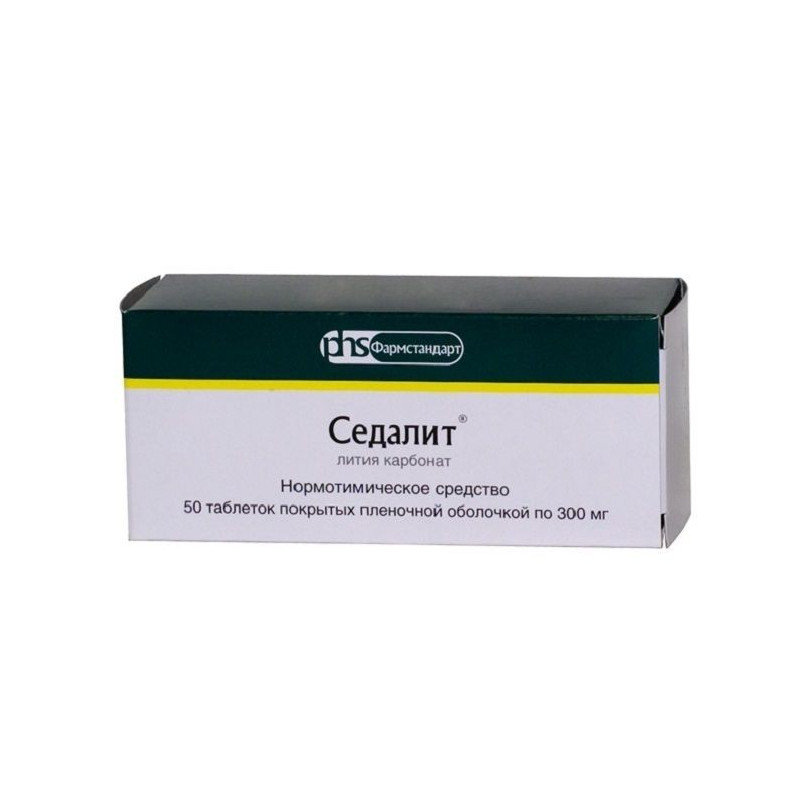



 All payments are encrypted via SSL
All payments are encrypted via SSL
 Full Refund if you haven't received your order
Full Refund if you haven't received your order
Pills
Lithium carbonate
50 pieces
SEDALIT - normotimichesky means (normalizes a mental state, without causing the general inhibition). It also has anti-depressive, sedative and anti-manic effects. The effect is due to lithium ions, which, as antagonists of sodium ions, displace them from the cells and thereby reduce the bioelectric activity of brain neurons. Accelerates the breakdown of biogenic amines (reduced concentration of norepinephrine and serotonin in brain tissue). Increases the sensitivity of the neurons of the hippocampus and other areas of the brain to the action of dopamine. Interacts with lipids formed during the metabolism of inositol.
In therapeutic concentrations, blocks inosyl activity1-phosphatase and reduces the concentration of neuronal inositol, which is involved in the regulation of the sensitivity of neurons.
The beneficial effect of lithium in migraine may be associated with changes in the concentrations of serotonin and histamine in platelets. Antidepressant effect may be associated with increased serotonergic activity and a decrease in the regulation of β-adrenoreceptor function.
Manic and hypomania states of various origins, prevention and treatment of affective psychoses, prevention and treatment of affective disorders in patients with chronic alcoholism. Migraine, Meniere's syndrome, sexual disorders, drug addiction.
Leukemia, severe surgery, pregnancy, lactation.
The dose is determined by the level of lithium concentration in the blood plasma. Is ingested. For adults, the dose is 300-600 mg 3-4 times / day. Therapeutic concentration of lithium in plasma - 0.6-1 mmol / l.
For children under the age of 12 - 15-20 mg 2-3 times / day.
Maximum Daily Dose for adults with intake is 2.4 g.
Nervous system: muscular weakness, hand tremor, weakness, drowsiness, with prolonged use, articulation disorders, hyperreflexia are possible.
Cardiovascular: heart rhythm disorders.
Gastrointestinal: dyspepsia.
From the side of the endocrine system: rarely, dysfunction of the thyroid gland.
Other: increased thirst, impaired blood formation, leukocytosis, weight gain.
With simultaneous use with thiazide diuretics, Indapamide, a rapid increase in plasma lithium concentration and the development of toxic effects is possible.
With simultaneous use with ACE inhibitors may increase the concentration of lithium in the blood plasma and the development of toxic effects; with NSAIDs - may increase the toxic effects of lithium; with Iodine preparations - an increased risk of thyroid dysfunction is possible; with xanthine derivatives - it is possible to increase the elimination of lithium in the urine, which can lead to a decrease in its effectiveness.
With simultaneous use with alprazolam may be a clinically significant increase in the concentration of lithium in the blood plasma; with Acyclovir - described a case of increased toxic action of lithium; with Baclofen - described cases of increased hyperkinetic symptoms in patients with Huntington's chorea.
With simultaneous use of lithium carbonate with Verapamil drug interaction is unpredictable. With simultaneous use of lithium carbonate with diltiazem, a case of psychosis has been described.
With simultaneous use with Haloperidol may increase extrapyramidal symptoms; with Carbamazepine, clonazepam - possible development of neurotoxicity.
With simultaneous use with methyldopa, the toxic effect of lithium may develop; with Metronidazole - it is possible to increase the concentration of lithium in the blood plasma.
When used simultaneously with sodium chloride, sodium bicarbonate, high sodium consumption increases the excretion of lithium, which can lead to a decrease in its effectiveness.
With simultaneous use with norepinephrine, it is possible to reduce the vasoconstrictor action of norepinephrine; with phenytoin - described the development of symptoms of the toxic effect of lithium; with Fluoxetine - it is possible to increase the concentration of lithium in the blood plasma and the development of toxic effects; with Furosemide, bumetanide described cases of increased toxic action of lithium.
With simultaneous use with chlorpromazine and other phenothiazines, it is possible to decrease the absorption of phenothiazines from the gastrointestinal tract and reduce their plasma concentration by 40%, increase the intracellular concentration of lithium and its rate of excretion in the urine, increase the risk of extrapyramidal reactions, delirium, dysfunction of the cerebellum (especially elderly people).
